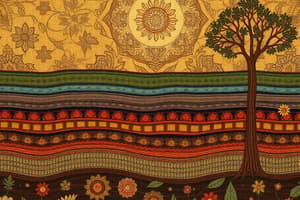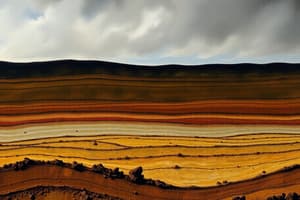Podcast
Questions and Answers
What is the smallest particle size in soil classifications?
What is the smallest particle size in soil classifications?
- Silt
- Loam
- Clay (correct)
- Sand
Which factor does NOT influence the type of soil produced?
Which factor does NOT influence the type of soil produced?
- Size of soil particles
- Height of local buildings (correct)
- Plant and animal life
- Climate
If a soil contains 20% clay, 60% silt, and 20% sand, what type of soil is it typically classified as?
If a soil contains 20% clay, 60% silt, and 20% sand, what type of soil is it typically classified as?
- Clay
- Silty clay
- Clay loam
- Silt loam (correct)
What characteristic differentiates residual soil from transported soil?
What characteristic differentiates residual soil from transported soil?
Why is the regolith of the moon not considered a true soil?
Why is the regolith of the moon not considered a true soil?
What is the first step in the soil formation process?
What is the first step in the soil formation process?
What role do organisms play in the soil formation process?
What role do organisms play in the soil formation process?
What type of soil is formed at high latitudes and altitudes?
What type of soil is formed at high latitudes and altitudes?
Which of the following statements about transported soil is correct?
Which of the following statements about transported soil is correct?
What characteristic distinguishes desert soils?
What characteristic distinguishes desert soils?
How does humus affect soil quality?
How does humus affect soil quality?
What determines the type of minerals a soil contains?
What determines the type of minerals a soil contains?
What is a common feature of tropical soils?
What is a common feature of tropical soils?
Flashcards
Soil Formation
Soil Formation
The breakdown of parent rock, influenced by various factors like climate, topography, and organisms, resulting in the formation of soil.
Soil Textural Triangle
Soil Textural Triangle
A tool used to classify soil types based on the relative proportions of clay, silt, and sand particles.
Clay
Clay
The smallest soil particle, contributing to soil's ability to retain water and nutrients.
Residual Soil
Residual Soil
Signup and view all the flashcards
Transported Soil
Transported Soil
Signup and view all the flashcards
Soil
Soil
Signup and view all the flashcards
Parent Rock
Parent Rock
Signup and view all the flashcards
Soil Horizons
Soil Horizons
Signup and view all the flashcards
Polar Soils
Polar Soils
Signup and view all the flashcards
Temperate Soils
Temperate Soils
Signup and view all the flashcards
Desert Soils
Desert Soils
Signup and view all the flashcards
Study Notes
Soil Formation
- Soil is a layer of broken rock, organic matter, and water covering Earth's surface.
- Bedrock breaks down into smaller pieces through weathering.
- Organisms like bacteria, fungi, and insects live in the weathered material and contribute to humus formation when they die.
- Humus improves soil quality, encouraging more organisms to live and die, creating more humus.
- Soil quality improves over time.
Soil Layers
- Soil is made up of layers called horizons.
- The O horizon: Organic debris like leaf litter.
- The A horizon (topsoil): Mineral particles mixed with organic matter.
- The B horizon (subsoil): Accumulated compounds draining down from above.
- The C horizon: Partly weathered parent material.
- The R horizon: Bedrock.
- Polar soils have good drainage but are shallow, with little distinct layers. They are found in high latitudes.
- Temperate soils range widely, influenced by climate and topography. Desert soils are thin, have little organic matter, but high salt content. Tropical soils have little humus due to leaching.
Soil Types
- Soil types depend on climate, plants, animals, time, and the parent rock.
- Soil texture depends on the proportion of clay, silt, and sand particles in the soil.
- A soil textural triangle is used to classify soil types based on percentages of each particle.
Practice Questions
- Question 1: A soil with 60% clay, 10% silt, and 30% sand is a clay loam.
- Question 2: A soil with 20% clay, 60% silt, and 20% sand is a silt loam.
- Question 3: A soil with 30% clay, 10% silt, and 60% sand is a sandy clay loam.
- Question 4: Regolith on the moon isn't considered true soil because it lacks organic matter and biological activity—vital components of soil formation.
- Question 5: Residual soil forms from the weathering of the underlying rock at the site. Transported soil is moved from another location.
- Question 6: Factors influencing soil conditions:
- Climate: Affects weathering rates, leaching, and plant life, impacting soil composition.
- Topography: Affects water drainage, erosion, and sunlight exposure.
- Parent rock: Influences the mineral composition and texture of the soil.
Studying That Suits You
Use AI to generate personalized quizzes and flashcards to suit your learning preferences.




